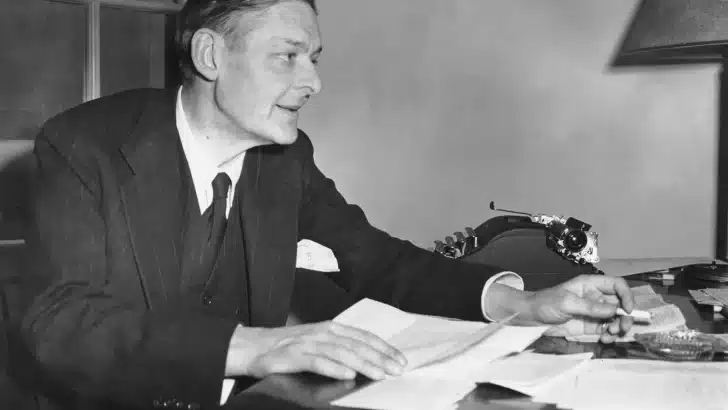Counting down to 2025, an old child’s riddle came to mind: “What time is it when the clock strikes thirteen?” The answer is obvious: “Time to buy a new clock!”
Though frankly, if it had been reported on RTE that the clock in Times Square had struck thirteen, as 2024 expired, would any of us have been surprised, given some of the Orwellian tales reported across all media in the past year? Most bizarrely, we hear daily that a man can become a woman on his own word.
“Can the flesh become word?” I muttered as I read of yet another news story of a male who demands his right to be a woman and gets it, preferred pronouns and all.
“Humankind cannot bear too much reality,” commented TS Eliot, who died 60 years ago this week on January 4, 1965. But, I wonder if we humans can stand any reality, in a world where the false ideology of radical transgenderism continues to take root in the media, the courts, the schools, the hospitals, the prisons, and the Parliaments.
This belief system – that some of us are trapped in the wrong bodies – is rooted in a disordered world, a world that does not want to hear the truth of the Christmas Day gospel – that “the word became flesh”.
Pretend
The world is free to choose but let us not pretend that a man can become a woman on his own say-so. The media is treading a minefield, but there are sensitive ways to handle and report gender dysphoria without descending into the Mad Hatter’s Tea Party.
It is a mind-blowing concept that this word became man and dwelt among us to free us from dysfunction and death”
These days the same writers who bend the truth, out of cowardice, fear or misguided compassion, are often the same ones who ridicule the great truth of John’s Gospel: “In the beginning was the word, and the word was with God, and the word was God”.
It is a mind-blowing concept that this word became man and dwelt among us to free us from dysfunction and death – and still dwells on earth through the Blessed Sacrament, in sacred scripture and in each one of us whether we know it or not.
Why do we often prefer to believe the ridiculous rather than the sublime? “Everyone is looking for you,” the apostles tell Jesus in Mark’s Gospel. In other words, all seek God.
Scandalised
Eliot himself scandalised the left wing literati when he embraced Christianity. The novelist Virginia Woolf wrote to her sister Vanessa Bell: “I have had a most shameful and distressing interview with poor dear Tom Eliot, who may be called dead to us all from this day forward. He has become an Anglo-Catholic, believes in God and immortality, and goes to church.”
Some critics claimed his work suffered from the addition of Christian themes, but like him, it became more fully alive. Eliot’s poem about the Magi’s great journey is a masterpiece, worth considering before we “return to our places….no longer at ease, here in the old dispensation, with an alien people clutching their gods…”
It is a mystery that so many clutch their gods while scorning Jesus, the true God, a mystery pondered by priests, prophets and philosophers.
Is unbelief simply due to the fact we do not want to face the truth about ourselves?”
Why is it that we find it easier to believe the ridiculous – or at least pretend we believe it while dismissing the truth as a fairytale?
Is unbelief simply due to the fact we do not want to face the truth about ourselves?
The wisdom of the saints tells us we seek God in the wrong places: the summer palaces, the awards ceremonies, the high offices, while ignoring the clues found in the Christmas story: Christ the Lord is to be sought in ordinary, lowly places, places far from the centres of worldly might. Bethlehem in Judea was a backwater, about as far away as you could get from glory two thousand years ago.
At this time of year, as well as The Journey of the Magi, I make a point of reading The Eternal Galilean by Venerable Fulton Sheen.
He describes the two kinds of people who find the Christ Child, the word made flesh: the shepherds and the wise men. The wise ask many questions but are wise enough to know that they don’t know everything, while shepherds simply accept the word of an angel and obey.
Archetypes
These two archetypes have one thing in common: they are both willing to stoop down, to bend the knee in adoration. It is this stoop of humility that is still required two millennia later.
As a Sister of Adoration, I used to tell people that Jesus is alive and well and living at 63 Falls Road, two doors down from Sinn Fein headquarters. A bemused smile would sometimes be the response, but there were plenty of people who turned up.
One day a woman, feeling lost, and confused, came to see Sr Elaine, who had left her law career after a powerful call in the convent Adoration chapel and whose advice once cost up to £300 an hour. After agreeing to pray for the lady, Sr Elaine also handed her some free advice: “Go in and see the Lord yourself. Jesus is waiting to be gracious to you and you will get the answer to all your prayers.”
The woman listened, returned to adoration and experienced the Blessed Sacrament in a new way.
Sr Elaine was then inspired to put a simple notice on the convent door. “Looking for a miracle? Feeling lost, empty, no answer to your prayers? The answer is right here in Jesus, in the Blessed Sacrament. You will receive your heart’s desire and it’s all free. The Lord waits to be gracious to you.”
There was a great response.
Isn’t that all we need for this new year, to meet the truth and experience the Blessed Sacrament in a new way, by turning, like the Magi and Shepherds, in humility towards Christ the King?
So let us cast away the dreams of darkness in 2025 – and welcome the word made flesh, who is Christ, the light of day.


 Martina Purdy
Martina Purdy Poet TS Eliot. Photo: Getty
Poet TS Eliot. Photo: Getty 